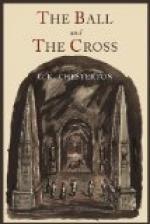“It never occurred to me before,” answered MacIan with tranquillity. “It is a good suggestion.”
And they set out at an easy swing down the steep road to the village of Grassley-in-the-Hole.
Grassley-in-the-Hole was a rude parallelogram of buildings, with two thoroughfares which might have been called two high streets if it had been possible to call them streets. One of these ways was higher on the slope than the other, the whole parallelogram lying aslant, so to speak, on the side of the hill. The upper of these two roads was decorated with a big public house, a butcher’s shop, a small public house, a sweetstuff shop, a very small public house, and an illegible signpost. The lower of the two roads boasted a horse-pond, a post office, a gentleman’s garden with very high hedges, a microscopically small public house, and two cottages. Where all the people lived who supported all the public houses was in this, as in many other English villages, a silent and smiling mystery. The church lay a little above and beyond the village, with a square grey tower dominating it decisively.
But even the church was scarcely so central and solemn an institution as the large public house, the Valencourt Arms. It was named after some splendid family that had long gone bankrupt, and whose seat was occupied by a man who had invented a hygienic bootjack; but the unfathomable sentimentalism of the English people insisted in regarding the Inn, the seat and the sitter in it, as alike parts of a pure and marmoreal antiquity. And in the Valencourt Arms festivity itself had some solemnity and decorum; and beer was drunk with reverence, as it ought to be. Into the principal parlour of this place entered two strangers, who found themselves, as is always the case in such hostels, the object, not of fluttered curiosity or pert inquiry, but of steady, ceaseless, devouring ocular study. They had long coats down to their heels, and carried under each coat something that looked like a stick. One was tall and dark, the other short and red-haired. They ordered a pot of ale each.
“MacIan,” said Turnbull, lifting his tankard, “the fool who wanted us to be friends made us want to go on fighting. It is only natural that the fool who wanted us to fight should make us friendly. MacIan, your health!”
Dusk was already dropping, the rustics in the tavern were already lurching and lumbering out of it by twos and threes, crying clamorous good nights to a solitary old toper that remained, before MacIan and Turnbull had reached the really important part of their discussion.
MacIan wore an expression of sad bewilderment not uncommon with him. “I am to understand, then,” he said, “that you don’t believe in nature.”
“You may say so in a very special and emphatic sense,” said Turnbull. “I do not believe in nature, just as I do not believe in Odin. She is a myth. It is not merely that I do not believe that nature can guide us. It is that I do not believe that nature exists.”




